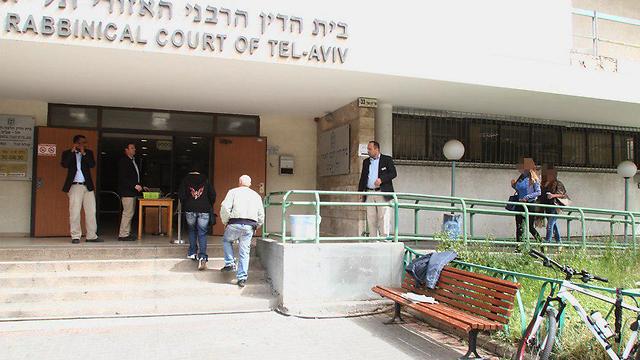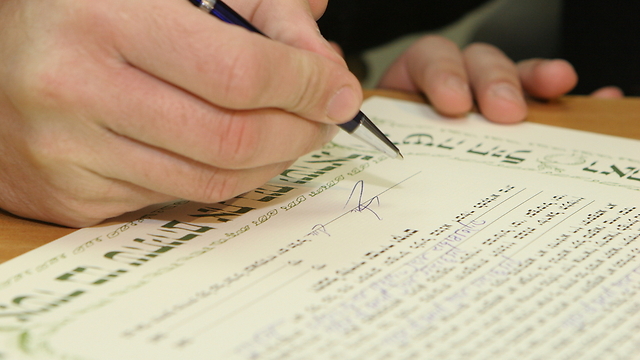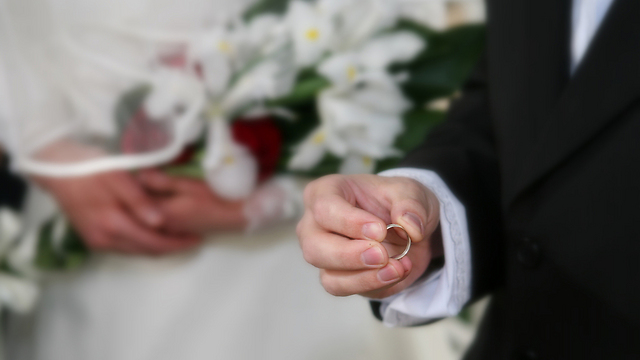

More than 6,000 can’t get married in Israel
6,787 Israelis appear on two Chief Rabbinate blacklists—one of people the Rabbinate has found to not be Jewish, and a larger one of people whose Jewish roots are in question; 'We are closing the door and pushing people out and creating a new Judaism,' says former MK Dov Lipman, an Orthodox rabbi himself.
It’s supposed to be one of the happiest days of your life. You’ve finally found the person you want to spend the rest of your life with, and you go to the office of the Chief Rabbinate in your town to register to get married. You assume it is merely a formality and start buying bride’s magazines and compiling your guest list.
A growing number of Israelis, however, are finding out they are on a blacklist, and are not able to be wed in the nation they call home. In some cases, says Rabbi Seth Farber, the founder of ITIM, an organization that helps couples navigate Israel’s religious bureaucracy, their parents or relatives were married in Israel, sometimes decades ago.
“The Rabbinate is initiating investigations into Jewishness for people who otherwise were living fine Jewish lives and had their papers in order,” Rabbi Farber told The Media Line. “They are turning their backs on a thousand years of established status quo.” According to that status quo, anyone who had already been married in Israel was considered Jewish, and there is no reason to further investigate.
A spokesman for the Rabbinate did not want to comment, but in the past officials have said they are trying to safeguard Judaism by making sure that all of its weddings are conducted according to strict Jewish law.
In Israel, there is no civil marriage or divorce. While anyone with one Jewish grandparent can come to Israel under the Law of Return and obtain immediate citizenship, only someone who has a Jewish mother or has had an Orthodox conversion by an approved rabbi can be married in Israel.
Rabbi Farber says there are now 6,787 Israelis on two blacklists—one that lists people the Rabbinate says have been found not to be Jewish, and another larger one which says the Judaism of the person on the list is in question. Thousands of Israelis are being added to the list each year, he says. Being on either list means that you, your children and in some cases, all of your maternal relatives, cannot wed in Israel.
While these lists have existed for many years, this is the first time that actual statistics have been published, and only after the Rabbinate was forced to respond to a Freedom of Information Act request initiated by ITIM.
“We’ve lost our minds,” Dov Lipman, a former member of Knesset for the Yesh Atid party and an Orthodox rabbi himself, told The Media Line. “Marriage does not require a rabbi, and does not require a stamp of approval. We are closing the door and pushing people out and creating a new Judaism.”
Anyone who finds themselves on one of the blacklists has two options. One is simply not to get married—an option that more and more young couples are choosing.
A second option is to marry abroad—marriages performed abroad are recognized by the Israeli government for government benefits and tax purposes. In fact, there are package wedding tours to Cyprus that include a Reform Jewish ceremony and a civil ceremony on the divided island.
Even for those allowed to marry in Israel, only Orthodox rabbis recognized by the Rabbinate can officiate at weddings.
Israeli press reports say that many of the Israelis on the list are of Russian origin. In the early 1990’s, more than one million Russian citizens with at least one Jewish grandparent moved to Israel and became citizens. About 300,000 of them are not Jewish according to Orthodox Jewish law and cannot get married in Israel.
Several Jewish organizations including ITIM and the Center for Women’s Justice, have appealed to the Supreme Court against the blacklists. They argue the lists are likely to further strain ties between Israel and Jews abroad especially in the United States, where the vast majority of Jews are non-Orthodox.
“We’re alienating the non-Orthodox population in the Diaspora who can’t relate to a totalitarian theocracy—even the more liberal wing of Orthodoxy in Israel can’t tolerate it,” Dr. Susan Weiss, the founder and director of the Center for Women’s Justice, told The Media Line. “The question is, 'What is a democracy?' and 'How do we celebrate the separation of church and state?'"
A recent poll found that 70 percent of Israelis favor the establishment of some type of civil marriage and divorce. Yet most analysts say it is unlikely that it will happen in Israel anytime soon.
Written by Linda Gradstein
Reprinted with permission from The Media Line.



















